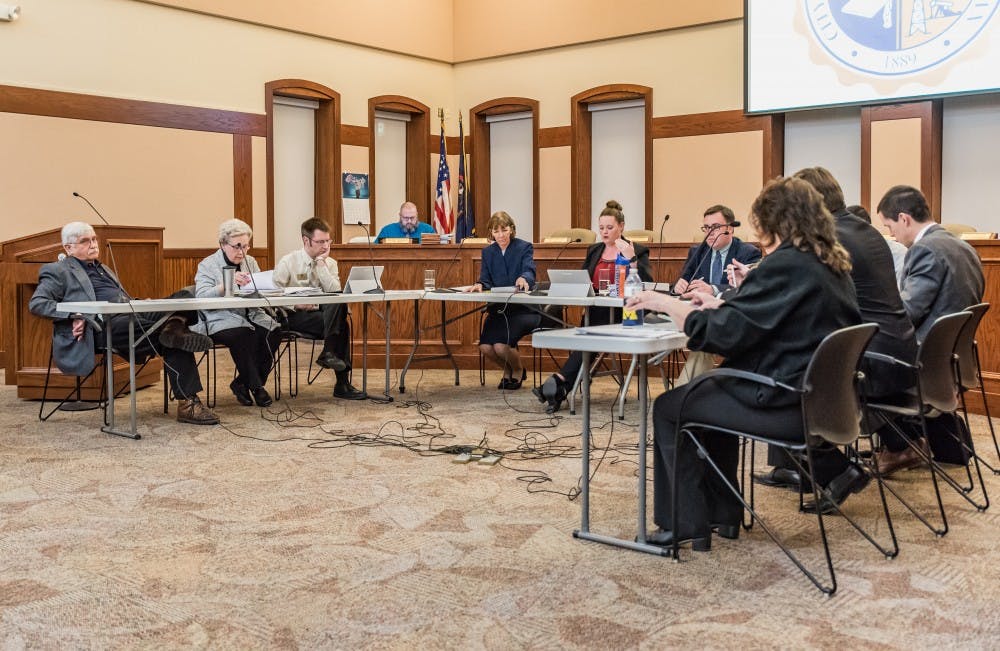CMU to enforce medical marijuana restrictions despite local ordinances

City Commission members discuss zoning ordinances for medical marijuana facilities on March 12 at Mt. Pleasant City Hall.
Mount Pleasant could see new medical marijuana facilities this fall, but regardless of state laws and city ordinances, Central Michigan University will remain a drug-free campus.
The Mount Pleasant City Commission is drafting an ordinance for the medical marijuana facilities.
While it is legal to consume marijuana medically or recreationally in some states, it is still illegal on the federal level — classified as a schedule I drug, alongside LSD, ecstasy and heroin.
Because CMU is a federally-funded university, its policies are in-line with federal laws and statutes. As long as someone is on CMU property, any incident involving marijuana will be handled without regard to state laws or city ordinances, said Tom Idema, director of Student Conduct.
“We go by the Drug Free Campus Act,” Idema said. “Because we get federal funding we will not allow drugs on campus, which includes marijuana and medical marijuana.”
Since 2008, the Michigan Medical Marijuana Act (MMMA) made it legal for Michigan residents to be prescribed marijuana for roughly 14 different conditions.
MMMA allowed patients to receive marijuana from caregivers, who grow marijuana for up to five particular patients, but it never permitted the use of dispensaries — stores that sell marijuana products to anyone with their Medical Marijuana Registry Identification Card (MMRIC).
In 2016, a second act, the Medical Marijuana Facilities Licensing Act (MMFLA), was signed by Gov. Rick Snyder in a package of bills that also expanded the law to allow marijuana-infused products, or “edibles.”
Dispensaries existed in Michigan for years but were subject to raids by police for not following state law. In December 2017, every dispensary in Michigan was shut down, while a new medical marijuana act was taking shape.
MMFLA allows marijuana dispensaries to sell products to anyone with their MMRIC, bypassing the traditional caregiver-to-patient system, said Mount Pleasant Director of Public Safety, Paul Lauria.
“Now marijuana (is) going more commercialized, where you can have big grow facilities and then people who have medical marijuana cards can go into a dispensary,” Lauria said. “There doesn’t have to be that relationship like there would be with the caregiver. So, it is dramatically different.”
The act allows dispensaries, along with other facilities, to exist within the state. However, each municipality must decide to “opt in” and write its own ordinance authorizing the use of MMFLA.
Mount Pleasant has opted in and is approaching the issue cautiously.
“We specifically did not want to be the first community that enacted an ordinance,” City Manager, Nancy Ridley said at a February City Commission work session.
The city commission is in the drafting stages of the ordinance, and according to the projected timeline, the ordinance will take effect June 28. After Feb. 12 work session, the commission decided to allow all five types of facilities, three of each type, and they defined buffer zones for the potential facilities.
If someone is a cardholder and doesn’t violate the state laws and city ordinance, he or she should have no problem with the Mount Pleasant Police, Lauria said.
“We typically — I’m not saying 100 percent — but we typically don’t have an issue with the people who carry their medical marijuana cards,” Lauria said. “Not to say we haven’t had any, but the people that go out and take the time to get their card, in my estimation, are fairly responsible.”
Lauria admits that the implications of the new facilities ordinance are largely unknown, but he knows what his responsibility is in the matter.
“What I know I can control is the education, the accessibility of it, and what happens when someone violates the law or something along those lines,” Lauria said.
However, as soon as a cardholder steps on CMU property, their MMRIC doesn’t exempt them from university policy.
“If we make contact (with suspects) and we find out they do in fact have a medical marijuana card,” said CMUPD Lt. Cameron Wassman. “Then we will either seize the drugs and or tell them to take it off campus.”
CMUPD is undergoing some changes in regard to how they handle marijuana-related incidents on and off campus to make their enforcement more consistent, Wassman said.
“It’s actually a fairly sticky situation,” Wassman said. “Because you have something that’s allowed by state law, but then you have something that is prohibited by policy, which comes from the federal Drug-Free Schools and Communities Act, that says you can’t have drugs on school property.”
If a student is caught using or possessing marijuana, a report will likely be filed to the Office of Student Conduct, where each situation is addressed and corrected, Idema said.
“Our goal here is to correct the behavior, and send people on back on and onto graduation,” Idema said.
He said the greatest challenge is for patients who live on campus in a residence hall or apartment.
“It’s kind of a dicey situation for some of those folks,” Idema said.
West Bloomfield senior Andrew Ruby had been caught twice with marijuana in the residence halls — once before he had his medical marijuana card, and once after.
“The day I got caught the second time was so bad I contemplated moving back home and stopping my education,” Ruby said.
After receiving another chance to stay enrolled at CMU from Idema, and paying hefty fines, Ruby now lives off-campus.
Ruby believes that the new medical marijuana ordinance will help the Mount Pleasant economy.
“It will be pretty interesting to see what happens,” Ruby said. “Hopefully it will drive more business to downtown.”





